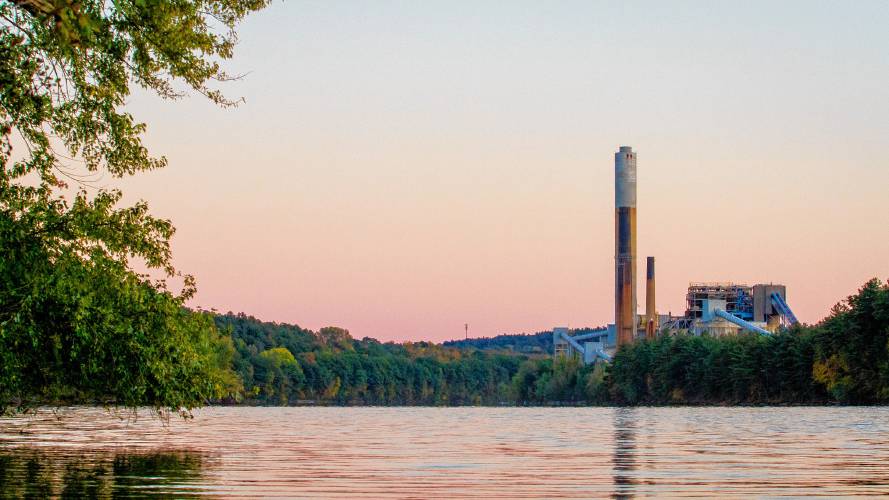Aborted pollution tests at Bow power plant won’t stop it from operating, say owners

The Merrimack Station power plant in Bow is seen at dusk on Thursday, Oct. 12, 2017. Monitor file
|
Published: 11-22-2023 2:12 PM
Modified: 11-29-2023 3:36 PM |
The Merrimack Station power plant in Bow twice failed to complete tests to renew certification of the scrubber technology on its smokestack this year, but the owners say this won’t get in the way of making electricity during periods of peak demand this winter.
“Merrimack Station will be fully available to operate when needed most to support the region’s energy demands on the coldest days of winter when other resources are either not available or more costly,” Granite Shore Power said in a statement responding to queries from the Monitor.
Problems began at a routine recertification test in February. The power plant, which has two units, could not pass the test regarding control of particulate matter such as soot from the burning of coal and fell short of some goals for controlling hydrogen chloride, according to Raymond Walters, field operation manager for the compliance bureau in the state’s Air Resources Division.
Granite Shore described the issue as: “That stack test did not result in any excessive emissions; however, because of failed mist eliminator tray sections in the scrubber, results did not represent site-specific normal operations.”
After analysis and discussion, Waters said, a retest was scheduled for Oct. 19 but “they had a problem getting one of two units operating” and the tests did not take place. Both of the units at the coal-fired power plant must be running at 90% efficiency or better for a test to go forward.
Granite Shore said during the Oct. 19 test the Unit 1 boiler “tripped offline due to an unrelated boiler tube leak, and the test was unable to be conducted. … The rescheduled performance test will take place in the coming weeks.”
It is unclear how much the plant has operated since the February failure and whether the owners would face any penalties from the Environmental Protection Agency for doing so.
The New Hampshire chapter of the Sierra Club, one of several environmental organizations seeking to shut coal-fired power plants, which are the most polluting source of electricity, pointed to the test problems as a cause of concern.
Article continues after...
Yesterday's Most Read Articles
“A mechanical failure at an aging coal plant does not instill public confidence in a facility or its owners. Rather, the failed smokestack test further proves that Merrimack Station is no longer a viable operating facility,” the group said in a prepared statement.
Merrimack Station, which opened in 1968, is the last coal-fired power plant in New England. It seldom produces electricity these days because cheaper power is usually available from natural gas plants and, increasingly, renewable energy.
The plant’s role on the grid is to be a “peaker plant” helping meet extreme demand, such as during cold snaps in winter or heat waves in summer. Otherwise it is quiet: During the second quarter of this year when the weather was relatively mild, for example, neither of the two units operated more than about 20 hours, Walter said.
Granite Shore receives “capacity payments” totaling millions of dollars a year for keeping Merrimack Station staffed and available as a peaker plant. Those payments, which are made even if it is not called on to produce electricity, are awarded by auction. Merrimack Station will stop receiving the payments as of 2026 because it was underbid by other power plants.


 Adam Montgomery sentenced to minimum 56 years on murder charges in young daughter’s death
Adam Montgomery sentenced to minimum 56 years on murder charges in young daughter’s death Neighboring landowner objection stalls Steeplegate redevelopment approval
Neighboring landowner objection stalls Steeplegate redevelopment approval Following budget cut, Pembroke revisits future of elementary school re-build
Following budget cut, Pembroke revisits future of elementary school re-build Granite Geek: Free government software for taxes – what could go wrong? (Not much, as it turns out)
Granite Geek: Free government software for taxes – what could go wrong? (Not much, as it turns out)
